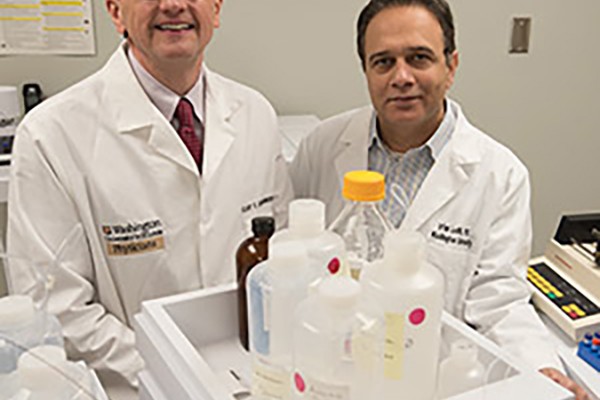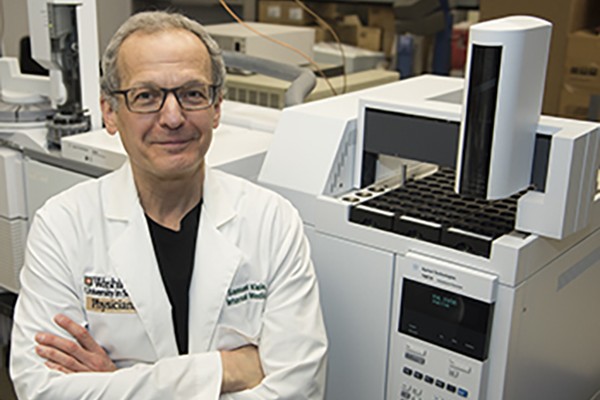Targeting fatty acids may be treatment strategy for arthritis, leukemia
Enzymes linked to diabetes and obesity appear to play key roles in arthritis and leukemia, potentially opening up new avenues for treating these diverse diseases, according to researchers Clay Semenkovich, MD, (left) and Irfan Lodhi, PhD, at the School of Medicine.
Not all obese people develop metabolic problems linked to excess weight
New research demonstrates that obesity does not always go hand in hand with metabolic changes in the body that can lead to diabetes, heart disease and stroke. Washington University School of Medicine researchers found that a subset of obese people do not have common metabolic abnormalities associated with obesity, and they don’t develop them when they gain more weight.
Most-read stories of 2014: In the field
Washington University researchers worked in the local community and across the globe in 2014 to better understand our bodies, our minds and our cultures.
School of Medicine art show accepting submissions
The School of Medicine’s 11th Annual Art Show is accepting submissions from students, faculty and staff. The art show will be held in the Farrell Learning and Teaching Center atrium, 520 S. Euclid Ave., from Jan. 13 through Feb. 11.
Most-read stories of 2014: In the laboratory
This year, Washington University researchers advanced our understanding of schizophrenia and Alzheimer’s disease, and developed devices to help surgeons see cancer cell and scientists to capture new vistas through the world’s fastest 2-D camera.
Obituary: Herbert Rosenbaum, 89, professor emeritus of neurology
Herbert Rosenbaum, professor emeritus of neurology at Washington University School of Medicine in St. Louis, died Dec. 10, 2014. He was 89.
Wash U Expert: Drug manufacturers must be held accountable for public safety
Fourteen people have been arrested in connection with a
2012 outbreak of fungal meningitis linked to steroid injections that
caused 64 deaths across the United States. The arrests, which resulted in two people being charged
with 25 acts of second-degree murder, remind us that drug manufacturers
must be responsible for their actions, says a noted medical ethics
expert at Washington University in St. Louis.
Plax honored for work with The SPOT
Katie Plax, MD, a professor of pediatrics at the School of Medicine, has received the Dr. Corinne Walentik Leadership in Health Award from the Missouri Foundation for Health. The award, in its second year, was created to honor the late Dr. Walentik’s commitment to serving vulnerable populations.
Alzheimer’s research awarded $30 million
Two major Alzheimer’s disease studies at Washington
University School of Medicine in St. Louis have received federal funding
totaling $30 million over the next five years.
$25 million gift from James and Elizabeth McDonnell endows The Genome Institute
Longtime philanthropists and civic leaders James and Elizabeth McDonnell have pledged $25 million to endow The Genome Institute at Washington University School of Medicine in St. Louis. The gift will fund innovative research to understand the genetic origins of diseases ranging from cancer and diabetes to autism and Alzheimer’s disease, with the aim of developing more effective diagnosis and treatment for patients.
Older Stories


